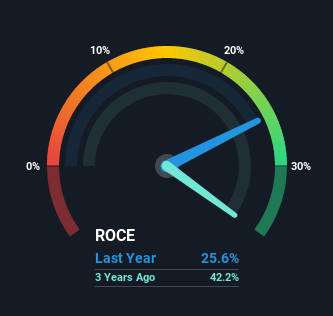Here's What's Concerning About Fine Organic Industries' (NSE:FINEORG) Returns On Capital

Did you know there are some financial metrics that can provide clues of a potential multi-bagger? Ideally, a business will show two trends; firstly a growing return on capital employed (ROCE) and secondly, an increasing amount of capital employed. Ultimately, this demonstrates that it's a business that is reinvesting profits at increasing rates of return. So while Fine Organic Industries (NSE:FINEORG) has a high ROCE right now, lets see what we can decipher from how returns are changing.
Understanding Return On Capital Employed (ROCE)
For those that aren't sure what ROCE is, it measures the amount of pre-tax profits a company can generate from the capital employed in its business. The formula for this calculation on Fine Organic Industries is:
Return on Capital Employed = Earnings Before Interest and Tax (EBIT) ÷ (Total Assets - Current Liabilities)
0.26 = ₹2.1b ÷ (₹10b - ₹2.0b) (Based on the trailing twelve months to December 2021).
Thus, Fine Organic Industries has an ROCE of 26%. In absolute terms that's a great return and it's even better than the Chemicals industry average of 18%.
See our latest analysis for Fine Organic Industries

In the above chart we have measured Fine Organic Industries' prior ROCE against its prior performance, but the future is arguably more important. If you'd like, you can check out the forecasts from the analysts covering Fine Organic Industries here for free.
So How Is Fine Organic Industries' ROCE Trending?
When we looked at the ROCE trend at Fine Organic Industries, we didn't gain much confidence. Historically returns on capital were even higher at 40%, but they have dropped over the last five years. Although, given both revenue and the amount of assets employed in the business have increased, it could suggest the company is investing in growth, and the extra capital has led to a short-term reduction in ROCE. If these investments prove successful, this can bode very well for long term stock performance.
On a related note, Fine Organic Industries has decreased its current liabilities to 19% of total assets. So we could link some of this to the decrease in ROCE. What's more, this can reduce some aspects of risk to the business because now the company's suppliers or short-term creditors are funding less of its operations. Some would claim this reduces the business' efficiency at generating ROCE since it is now funding more of the operations with its own money.
The Key Takeaway
While returns have fallen for Fine Organic Industries in recent times, we're encouraged to see that sales are growing and that the business is reinvesting in its operations. And long term investors must be optimistic going forward because the stock has returned a huge 280% to shareholders in the last three years. So should these growth trends continue, we'd be optimistic on the stock going forward.
Fine Organic Industries could be trading at an attractive price in other respects, so you might find our free intrinsic value estimation on our platform quite valuable.
Fine Organic Industries is not the only stock earning high returns. If you'd like to see more, check out our free list of companies earning high returns on equity with solid fundamentals.
New: AI Stock Screener & Alerts
Our new AI Stock Screener scans the market every day to uncover opportunities.
• Dividend Powerhouses (3%+ Yield)
• Undervalued Small Caps with Insider Buying
• High growth Tech and AI Companies
Or build your own from over 50 metrics.
Have feedback on this article? Concerned about the content? Get in touch with us directly. Alternatively, email editorial-team (at) simplywallst.com.
This article by Simply Wall St is general in nature. We provide commentary based on historical data and analyst forecasts only using an unbiased methodology and our articles are not intended to be financial advice. It does not constitute a recommendation to buy or sell any stock, and does not take account of your objectives, or your financial situation. We aim to bring you long-term focused analysis driven by fundamental data. Note that our analysis may not factor in the latest price-sensitive company announcements or qualitative material. Simply Wall St has no position in any stocks mentioned.
About NSEI:FINEORG
Fine Organic Industries
Engages in manufacture, processing, supply, distribution, dealing, import, and export of oleochemical-based additives in India and internationally.
Flawless balance sheet with proven track record.
Market Insights
Community Narratives



